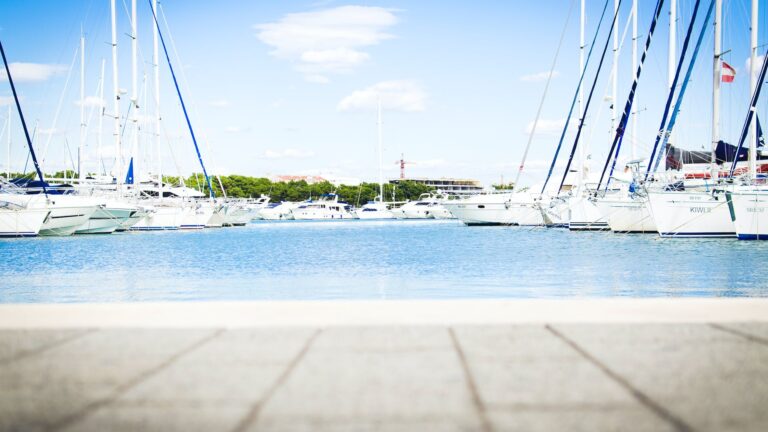Can you sail a boat while sleeping?
-
Introduction
-
What is Sailing?
-
What is single-handed Sailing?
-
The Necessity of Sleep while Sailing
-
The Challenges of Sleeping while Sailing
-
What is a Watch System?
-
How do Sailors Sleep in Shifts?
-
What are the Benefits of Sleeping in Shifts?
-
What Precautions Should Be Taken While Sleeping?
-
Can a Boat be Sailed While Asleep?
-
Conclusion
Can You Sail a Boat While Sleeping?
Sailing has been around for centuries, and modern sailors enjoy the same sense of freedom and adventure as their predecessors did before them. Whether it’s a single-handed voyage or a crewed racing regatta, sailing can be an incredibly rewarding experience, especially when done safely and responsibly. But what about those times when you need to sleep while sailing? Can you sail a boat while sleeping? Let’s explore this question in more detail and examine the challenges and benefits of sleeping while sailing in the open ocean.
What is Sailing?
Sailing is the practice of using wind to propel a boat through water using sails mounted on masts or booms, as well as oars or other means of propulsion such as an engine or motor if necessary. It requires knowledge, skill, and experience to be able to sail safely and efficiently, but doing so can provide an incredibly rewarding experience on the open sea.
## What is Single-Handed Sailing?
Single-handed sailing refers to sailing without any crew—just the sailor alone on board the boat for the entire voyage or race, depending on the purpose of their trip. This type of sailing takes an incredible amount of skill and is reserved for only the most experienced sailors who understand both their boat and the waters they are traversing extremely well.
## The Necessity of Sleep While Sailing
No matter how experienced a sailor may be, there will come a time when they will need to rest in order to remain alert and focused when sailing long distances or participating in races that last several days or weeks at sea. This means that they must find ways to sleep while still ensuring their boat remains on course and out of harm’s way during their rest periods.
## The Challenges of Sleeping While Sailing
Sleeping while sailing presents some unique challenges due to its inherently risky nature: if something goes wrong while you’re sleeping, it could have disastrous consequences by the time you wake up, especially if you are single-handed sailing without any help from other crew members who might be able to take over immediately if needed. Additionally, attempting to sleep in adverse conditions such as strong winds or choppy waters can make it difficult for sailors to get adequate rest despite their best efforts, leading them to become fatigued much more quickly than if they were able to sleep comfortably at home in their own beds instead.
## What is a Watch System?
A watch system is how crews manage their rest periods so that someone remains alert at all times—even when everyone else is sleeping—in order to ensure the safety of everyone on board and prevent any potential accidents from occurring due to someone falling asleep at an inappropriate time or place (such as behind the wheel). On larger vessels with multiple crew members aboard, this typically takes place by having two people take turns sleeping for two-to-six hours at a time before swapping out with someone else who has been awake during that period (also known as “hot bunking”). This ensures that someone remains alert at all times while still allowing everyone on board some much-needed rest during long voyages or races without having to rely heavily on stimulants such as caffeine in order to stay awake throughout the entire duration of their journey (although this too may still occur depending on individual circumstances).
## How do Sailors Sleep in Shifts?
When sleeping in shifts aboard sailboats with multiple crew members present, each person typically takes two shifts per day (or night) so that no one person remains alert for too long at any given time—this helps prevent fatigue from setting in prematurely due to overexertion from being awake too many hours consecutively without enough rest between shifts (typically two hours). Depending on individual needs/preferences each person may also choose different lengths for their shifts such as four hours per shift instead of two so that they get more rest at once but fewer breaks throughout their day/night cycle; this should still provide sufficient coverage throughout each shift however since there are usually multiple people aboard doing this simultaneously who can take over if needed during any given period (and also depending on how many people are present).
## What are the Benefits of Sleeping in Shifts?
Sleeping in shifts aboard sailboats provides numerous benefits such as allowing everyone onboard some much-needed rest between shifts despite having limited space available for sleeping quarters; additionally it ensures that someone remains alert at all times so there is always someone available who can take over should anything happen during someone else’s shift that requires immediate attention which might not have been noticed if everyone was asleep simultaneously (such as another vessel crossing paths with your own). Furthermore it helps prevent fatigue from setting in prematurely due to overexertion since no one person has too much responsibility placed upon them at any given time—each individual gets sufficient breaks between shifts which helps keep them refreshed and alert even after days/weeks spent out at sea without proper access to traditional beds/bedrooms like one would find ashore.
## What Precautions Should Be Taken While Sleeping?
When sleeping aboard sailboats several precautions should be taken—especially when single-handed sailing—in order to ensure safety throughout your journey: firstly make sure you set an alarm before going into your bunk so you don’t accidentally oversleep; secondly set up some kind of system where you can hear/see notifications from your navigation system even when asleep incase something changes suddenly that requires your attention; thirdly keep your safety harness attached even when asleep so you don’t risk falling overboard should anything unexpected occur; fourthly make sure all life preservers are easily accessible just incase; fifthly try not to spend too much time sleeping consecutively since fatigue can set in quickly leading you into dangerous situations you may not have been expecting; lastly get sufficient rest before setting off again after waking up so you remain alert throughout your next shift(s).
## Can a Boat be Sailed While Asleep?
The short answer is no —there is no way for anyone (no matter how experienced) to safely sail a boat while asleep since unexpected events could occur which require immediate attention yet would go unnoticed until it was too late had no one been awake onboard at all times throughout each voyage/regatta/etcetera; therefore it is essential that someone remain alert during all parts of each trip so they can react quickly should something suddenly go wrong during those moments where everyone else onboard may be asleep simultaneously (even though most boats have alarms setup which should go off if something unexpected happens).
## Conclusion
Sleeping while sailing presents its own unique set of challenges due mostly due its risky nature yet these can be mitigated somewhat through careful planning beforehand such as setting up watch systems amongst multiple crew members onboard larger vessels (or relying solely upon alarms whilst alone) as well as taking other precautions such as keeping safety harnesses attached even when asleep plus making sure life preservers are easily accessible just incase anything unexpected happens whilst no one else onboard was paying attention due being asleep simultaneously themselves—all these measures combined should help ensure safe journeys even throughout long voyages/races out at sea taking place over days or weeks without proper access back ashore like we often have here on land!







